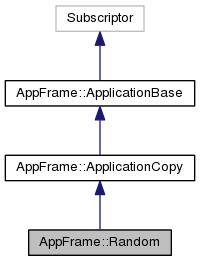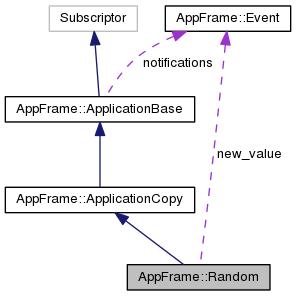|
OpenFCST: The open-source Fuel Cell Simulation Toolbox
|
|
OpenFCST: The open-source Fuel Cell Simulation Toolbox
|
An application class solving the same problem with a set of random start vectors. More...
#include <random.h>


Public Member Functions | |
| Random (ApplicationBase &app, bool store_vectors=false) | |
| Constructor, receiving the application solving the problem. | |
| ~Random () | |
| Clean up allocated vectors in destructor. | |
| virtual void | declare_parameters (ParameterHandler ¶m) |
| Declare parameters for a parameter file. | |
| void | _initialize (ParameterHandler ¶m) |
| Read the parameters. | |
| virtual void | initialize (ParameterHandler ¶m) |
| Pure virtual initialization function. | |
| double | amplitude () const |
| The amplitude of the random distribution. | |
| virtual void | solve (FEVector &start, const FEVectors &rhs) |
| Solve the problem a lot of times. | |
 Public Member Functions inherited from AppFrame::ApplicationCopy Public Member Functions inherited from AppFrame::ApplicationCopy | |
| ApplicationCopy (ApplicationBase &ex_app) | |
| Constructor for a derived application. | |
| ~ApplicationCopy () | |
| virtual void | remesh () |
| Generates the next mesh depending on the mesh generation parameters. | |
| virtual void | init_vector (FEVector &dst) const |
| Initialize vector to problem size. | |
| virtual void | start_vector (FEVector &dst, std::string caller) const |
| Initialize vector to problem size. | |
| virtual double | residual (FEVector &dst, const FEVectors &src) |
| virtual void | Tsolve (FEVector &start, const FEVectors &rhs) |
Solve the dual system assembled with right hand side rhs and return the result in start. | |
| virtual double | estimate (const FEVectors &src) |
| Error estimation. | |
| virtual double | evaluate (const FEVectors &src) |
| Evaluate whatever the simulation was made for. | |
| virtual void | grid_out (const std::string &filename) const |
| Write the mesh in the format specified by the ParameterHandler. | |
| virtual void | data_out (const std::string &filename, const FEVectors &src) |
| Write data in the format specified by the ParameterHandler. | |
| virtual std::string | id () const |
| Return a unique identification string for this application. | |
| virtual void | notify (const Event &reason) |
| Add a reason for assembling. | |
 Public Member Functions inherited from AppFrame::ApplicationBase Public Member Functions inherited from AppFrame::ApplicationBase | |
| ApplicationBase (boost::shared_ptr< ApplicationData > ex_data=boost::shared_ptr< ApplicationData >()) | |
| Constructor for an application. | |
| ApplicationBase (const ApplicationBase &other) | |
| Copy constructor. | |
| virtual | ~ApplicationBase () |
| Virtual destructor. | |
| void | print_parameters_to_file (ParameterHandler ¶m, const std::string &file_name, const ParameterHandler::OutputStyle &style) |
| Print default parameters for the application to a file. | |
| virtual double | residual (FEVector &dst, const FEVectors &src, bool apply_boundaries=true) |
Compute residual of src and store it into dst. | |
| virtual void | data_out (const std::string &filename, const FEVectors &src, const std::vector< std::string >) |
| boost::shared_ptr < ApplicationData > | get_data () |
| Get access to the protected variable data. | |
| const boost::shared_ptr < ApplicationData > | get_data () const |
| Get read-only access to the protected variable data. | |
| virtual void | clear () |
| Reset the application class such that a call to initialize() is possible again and will produce the same result as if the object was fresh. | |
| void | clear_events () |
| Clear all notifications. | |
Static Public Attributes | |
| static const Event | new_value |
| This Event is raised whenever Random picked a new value. | |
Protected Attributes | |
| std::vector< SmartPointer < FEVector > > | results |
| A vector storing the results of all the runs. | |
| double | scaled_amplitude |
| The amplitude of the sample around the start value scaled by the maximum random number. | |
| bool | store_vectors |
If this is false, don't store the vectors after each sample but rather call evaluate. | |
 Protected Attributes inherited from AppFrame::ApplicationCopy Protected Attributes inherited from AppFrame::ApplicationCopy | |
| SmartPointer< ApplicationBase > | app |
| Pointer to the application this one depends upon. | |
 Protected Attributes inherited from AppFrame::ApplicationBase Protected Attributes inherited from AppFrame::ApplicationBase | |
| boost::shared_ptr < ApplicationData > | data |
| Object for auxiliary data. | |
| Event | notifications |
| Accumulate reasons for reassembling here. | |
Additional Inherited Members | |
 Protected Member Functions inherited from AppFrame::ApplicationBase Protected Member Functions inherited from AppFrame::ApplicationBase | |
| void | print_caller_name (const std::string &caller_name) const |
| Print caller name. | |
An application class solving the same problem with a set of random start vectors.
| AppFrame::Random::Random | ( | ApplicationBase & | app, |
| bool | store_vectors = false |
||
| ) |
Constructor, receiving the application solving the problem.
If store_vectors is false, then call evaluate() after every sample. Else, store all results in results and leave the call of evaluate() to the enclosing function; in this case, you should derive a class with a function evaluate() in order to have access to results.
| AppFrame::Random::~Random | ( | ) |
Clean up allocated vectors in destructor.
| void AppFrame::Random::_initialize | ( | ParameterHandler & | param | ) |
Read the parameters.
| double AppFrame::Random::amplitude | ( | ) | const |
The amplitude of the random distribution.
|
virtual |
Declare parameters for a parameter file.
Pure virtual function MUST be redeclared in derived classes.
Reimplemented from AppFrame::ApplicationCopy.
|
virtual |
Pure virtual initialization function.
Here, the parameters declared in the constructor are actually read from ParameterHandler.
This function must be overloaded in any derived class using its own values from the parameter file.
Initialization functions of derived classes must make sure to call all functions _initialize() of the base classes.
Reimplemented from AppFrame::ApplicationCopy.
Solve the problem a lot of times.
If the vectors are not stored (store_vectors is false), then the function evaluate of the underlying application may accumulate results in a named vector "Random", which will then be returned as the value of start.
Reimplemented from AppFrame::ApplicationCopy.
|
static |
|
protected |
A vector storing the results of all the runs.
This can be used by the function evaluate() of a derived class to do some statistical analysis of these results.
|
protected |
The amplitude of the sample around the start value scaled by the maximum random number.
|
protected |
If this is false, don't store the vectors after each sample but rather call evaluate.
 1.8.2
1.8.2